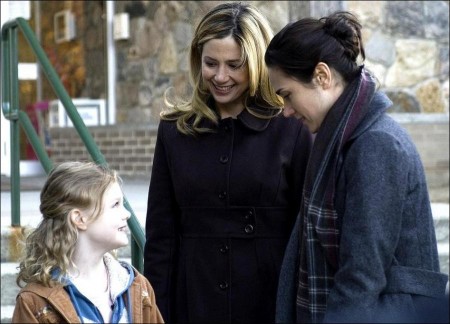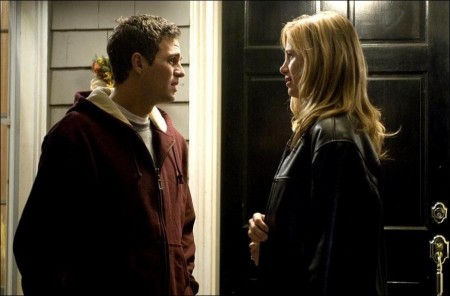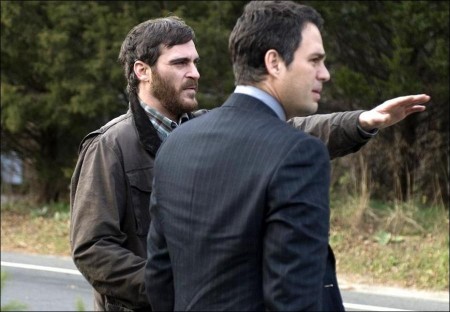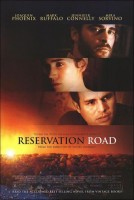Tagline: To find the truth, you have to find who’s hiding it.
The fates of two men and their families converge following a tragic accident. Ethan Lerner (Joaquin Phoenix) and his family are on the way home from their son’s cello recital. That same evening, law associate Dwight Arno (Mark Ruffalo) and his son are on their way back from a baseball game. In a flash, the unthinkable happens, and Ethan’s son dies under the wheels of Dwight’s car. Dwight speeds away, and Ethan, as the only witness to the tragedy, begins his own quest for justice.
Writer / director Terry George was looking for a film to be able to follow his Hotel Rwanda, which had received three Academy Award nominations. George says, “I pursued Reservation Road in part because it investigated the motives of revenge and hatred and fear, and where those lead people. In this post-9/11 world, `an eye for an eye’ needs to be examined through drama. What happens when that thing we see on television `revenge’ comes home to you on a very personal level? I saw this story as realistic and important.
Producer Nick Wechsler states, “The narrative is so suspenseful, as the lives of these two men are being propelled on a collision course. It’s such a tense and powerful story; you can’t help but think, `What would I do in either of these fathers’ situations?'”
“Dwight has done something that he can never take back,” adds author and screenwriter John Burnham Schwartz. “Ethan begins to weigh doing something that he will never be able to take back.”
The story and the characters originated in Schwartz’ novel Reservation Road. First published in 1998, the novel was selected as a New York Times Notable Book of the Year, and was praised by The Los Angeles Times as “a dark and irresistible miracle: a heartbreaking thriller.”
Schwartz comments, “Like many storytellers, I suppose I’m naturally drawn to extreme situations. I wanted to see who the characters would become under great and difficult pressure. It was when I imagined the character of Dwight that I realized he was a father, too. That’s when the full scope of the narrative came into view.”
“Great tragedy encompasses life and death and family, and I think Reservation Road is a classic example of that,” says George. “What these people go through is tragic, and all too human. Those emotions, plus the suspense of the hunt for Dwight, made this a perfect story to tell on-screen.”
The author worked on the book for several years. It would be several more years before the novel became a motion picture. Schwartz reveals, “It was optioned for five years to two production companies. Ultimately, my wife, Aleksandra Crapanzano, who is herself a screenwriter, encouraged me to adapt it myself. I did so on spec, over a six-month period. It went out again and there was renewed interest.
“But Nick Wechsler was the first producer who called me. He’d read the book in an afternoon and phoned me right away. What he had to say about what it was in the story that spoke to him, and why he thought it would be a good movie, gave me a sense of shared perspective. That was important, since novelists by nature sit in a room alone and are not collaborators. The process became a great education for me; Nick optioned it in February 2005.”
While developing the project, Wechsler was also producing We Own the Night, his third movie starring Joaquin Phoenix. The producer got the Reservation Road script to Phoenix, who responded to it immediately.
Two-time Academy Award-nominated producer A. Kitman Ho had produced Hotel Rwanda with George, who had directed Phoenix in a small but pivotal role in the movie. Fortuitously, “Joaquin loved the script and suggested showing it to Terry,” says Ho. “Terry and I were developing another project when this one came to our attention.”
George immediately switched to working on Reservation Road. He explains, “I took the script and read the book, then made a compression and distillation of both. I wanted to find the immediacy of it, and lock the audience into these characters’ lives to see how they interact. They all live in a small town, and by the nature of small towns throughout America and the world, people’s paths will cross.”
From the actor’s standpoint, Phoenix offers that he “had a visceral reaction to the script. I liked that was a thriller, but most interesting to me was its successfully telling two sides of the same story; both Ethan and Mark are fully realized, completely different and unique. Terry George understands deep emotions, yet he is unsentimental; I knew he would find the right balance.”
George notes, “It was important to investigate all the characters and really get inside their heads to see what they were going through. Ethan has an almost idyllic life, and suddenly the world falls apart for him and his wife. In Dwight’s case, the accident follows a life of procrastination and bad decisions. Is he finally going to come to terms with who he is and what he will become?”
Reservation Road soon came together as the first movie to be made in the unique filmmaking partnership between Focus Features and Random House Films. The multi-year deal, announced in November 2005, has the companies developing movies together and co-financing and co-producing them. Reservation Road was published in 1998 by Random House, Inc.’s Alfred A. Knopf hardcover imprint. To coincide with the film’s release, Random House’s Vintage Books imprint is reissuing the book in both mass market and trade paperback as movie tie-in editions.
With a safe haven for the project, casting quickly progressed. George reports, “Joaquin and I talked about who could play Dwight, and Mark Ruffalo was the first person that we both talked about. We’d both met him and wanted to work with him.”
Ruffalo was drawn to not only “the cat-and-mouse thriller aspect, but how these two men’s paths crossing in this horrible situation makes for intense drama that shows you something about aspects of humanity. The character of Dwight intrigued me because he’s the sort of person that we write off, get a little righteous about and just say, `What a scumbag.’ I liked the challenge of finding what was human about what Dwight does and how he reacts. This kind of thing happens to people all the time, in a split second. I tried not to judge him too hard.
“The key was the line, `Getting away is not the same as being free.’ Dwight is an underachiever who hates himself so deeply. At this point in his life, he’s struggling to come to peace with himself and his past. After the accident, he becomes less and less a part of the living. What keeps him going is his love for his son and his realization of the importance of being a father, and what he has to do for his son.”
Schwartz marvels, “Mark inhabits Dwight. He found variations on the character that only a great actor could. Watching him work, I’d see things come across that I hadn’t written in, but that he was able to get at.
“These two fathers, though very different, mirror each other in terms of their relationships. They both love their sons, and there’s proximity between them that increases to partial knowledge and acquaintance.”
Phoenix had stepped in for Ruffalo on a movie [M. Night Shyamalan’s Signs]a few years back when the latter had to withdraw because of an emergency. Phoenix laughs, “I remember when I saw You Can Count on Me [even earlier,] I nearly retired. I thought, `Whoever this Mark Ruffalo is, he’s the best and he’s doing something really special’. He’s just an incredible actor.
“It was very fortunate for us that Mark wanted to be part of this journey on Reservation Road. As a fellow actor, he turned out to be constantly surprising and emotionally available, with a brilliant understanding of character and story.”
Ruffalo reveals, “The initial plan was that Joaquin and I would never see each other until it came time to do our scenes together. But we hit it off pretty strongly, so we ended up hanging out a lot. He’s one of our best actors, and I knew I could learn quite a bit from him working on Reservation Road — which I did. He is generous and thoughtful.”
George further praises Phoenix’ “amazing power as an actor. There’s a truthfulness about Joaquin that keeps you grounded; he will not let something stay in, or play out, if he thinks it’s false or doesn’t ring true. For a director, that’s an emotional lifeline.”
Phoenix notes, “Ethan is a man who can’t really cope with his grief, or express it. He isn’t able to mourn in the way that his wife does. His grief then manifests itself in vilifying the man who was on Reservation Road.”
In trying to better understand his character, Phoenix felt strongly that he needed to “meet with people that had had this terrible experience. We contacted Mothers Against Drunk Driving [M.A.D.D.], who introduced us to a number of people who came in and shared their stories with us. I was able to see firsthand a bitterness and a pain that doesn’t seem to go away.
“I also read a number of books about grieving and loss and learned how men deal with loss differently than women, and how families can clash. If we were going to tell this story, it was very important to me that we told it as accurately as possible and understood what these families’ experiences were.”
Schwartz remembers, “On book tours, I had people come up to me who had lost children, sometimes in just this way. It was difficult to talk to them, but it was gratifying as well because they felt that they had been helped by the story being told.”
Telling the story and sustaining the tension on-screen, as opposed to on the page, required some streamlining. Schwartz affirms, “Terry, as a writer himself, made any number of improvements in the way the story moved and flowed. It was important for the audience to stay emotionally involved with these characters all the way through, especially as the suspense intensifies as to just what Ethan will do.”
Also key to the story are the characters of the mothers of the two men’s sons. Wechsler and Phoenix had both worked with Academy Award winner Jennifer Connelly before, and “she was my first choice for Grace,” states Wechsler.
Schwartz confirms, “During scripting, she was the first person I thought of for the character. Once on the set, in the scenes where Grace is grieving, I saw Jennifer was Grace. For her own sake, I hope that she’s going to do a comedy next.”
Connelly admits, “I read the script, put it down, and tears were streaming down my face as I walked over to my husband. I said to him, `I’ve just read the most beautiful script.’ It was quite tense, and moving and cathartic. I also read the book and made notes from it; `Oh, I’ll take that,’ or `Mmm, I’m not sure that works for me in what I want to do.’
“But Grace was, without a doubt, the toughest role I have ever played.”
Ruffalo admits, “As much as you try to separate yourself from the characters you play, I was caught by surprise sometimes by how deeply it was affecting me.”
George, who did not call for a pre-production rehearsals process with his actors, adds, “This story had to be grounded in reality — and in an emotional reality that people don’t ever want to face. With this cast, we were blessed that they could explore it.”
Ruffalo remarks, “I’ve only ever worked with a few directors who have the willingness to let it all hang out and talk things through the way Terry does. One of the themes in his movies, and from his own life experiences, is forgiveness; you look at someone you’ve demonized and see that there’s a human being in there.”
Connelly says, “You think, `What kind of villain could do this?’ Watching Ethan get closer and closer to Dwight, the man he’s trying to catch, is so suspenseful that you’re bracing yourself for what will happen between them.
“Terry’s patience and support on the set were marvelous. He’s one of my favorite people that I’ve ever worked with. I know Terry was helpful with Joaquin, too. Through his and Mark’s humanizing performances, you feel for both Ethan and Dwight.”
Phoenix offers, “On the set and during takes, we would make discoveries in the moment, which I already knew Terry to be very good at. The journey of making a movie is mysterious when you start out. You don’t really know what you are going to end up with, which is part of the joy and excitement of making a film. Why Reservation Road was one of the hardest I’ve done, and I think maybe why Jennifer felt it was the most difficult one she’s done, was because each scene was a discovery. Having not rehearsed, we went in never really knowing the answer. We had freedom in terms of movement because Terry used multiple cameras, a lot of which were handheld.”
Connelly notes, “Joaquin is always exploring; he leaves no stone unturned, so it makes for a working environment where another actor can’t be lazy — which is great, especially since I didn’t always know where to turn with this role.
“There are different stages of Grace’s grief. In the beginning, Grace is just in shock and it’s difficult for her to fathom what has happened. Then she goes through extreme guilt, self-loathing, and fear. Ultimately, she comes to realize that, for the sake of her family, she has to cope and stay in the everyday and navigate it.”
Academy Award winner Mira Sorvino, cast as Dwight’s ex-wife Ruth — who is also music teacher to both Learner children — states, “I was haunted by the script, which I found to be so suspenseful and exciting; I think audiences will watch this movie with bated breath, waiting to see what’s going to happen next.
“My character’s ex-husband, Dwight, goes through an intense self-excoriation. Consumed by his guilt, he’s trying to figure out how to become a man again because he’s really sort of lost his sense of manhood. Ruth and Dwight had a knock-down, drag-out kind of marriage, and the divorce was equally explosive. Their son Lucas was and is caught in the middle.”
Schwartz sees the character of Ruth as “essential for the story and for the audience, which Mira understood. Ruth is very strong and has an optimism about life going on, which is a very important outlet in the story.”
Sorvino elaborates, “My character is now a music teacher at an elementary school, but she used to be a jazz singer. So I saw her as finding fulfillment and real pride in bringing music into the lives of children. Ruth almost communicates better with children than with adults. She encourages Emma, to help her cope with what has happened.”
George knew that the characters of the children were as central to the story as those of their parents. He relates, “I wanted to see how the children’s lives were affected. Reservation Road is a story about family, and the children are the catalysts for many of the actions in it. Lucas is pivotal in terms of the accident and in terms of motivating Dwight at every point; Emma is the surviving child in the Learner family, and how she copes and how her parents now relate to her is dramatic as well.”
Elle Fanning, who previously etched a notable on-screen portrayal of a child coping with family tragedy in The Door in the Floor, sees her on-screen family in the new film as “trying to get back on their feet again, and trying to heal. I learned a lot from Joaquin and Jennifer; I would get into my mood and my character and do it as real as possible. Terry always knew exactly what he wanted, but he would let you put your word into it too.”
Eddie Alderson, who makes his screen debut as Lucas, adds, “Terry would do a camera rehearsal and then talk with the actors. It’s really cool working with him.
“Lucas is already in a tough situation because of the fighting going on between Dwight and Ruth. Then, Dwight should have turned around and gone back after the accident. But I feel in that situation, a lot of people would get scared and not know what to do.”
Sorvino, the only adult actor who has scenes with both of those young actors, found herself “blown away by Elle and Eddie’s humility and their normalcy. They’re sweet kids, but they also worked so hard on their characters.”
Connelly adds, “I was a child actress myself, though not yet at Elle’s age; she has been working basically since she was a baby — and she’s great, so energetic and enthusiastic. She watches carefully, takes everything in, and — considering the subject matter of our movie — has a good time.”
Indeed, when not working on the set, the younger actors could be found spending time with the crew hotel, or shooting pool in and around Connecticut locations, where filming took place in the fall of 2006 — just after some of the state’s new tax breaks for film productions had been instituted.
While Schwartz had set his story in the state’s northwestern passage, the production established Stamford as their base because of its proximity to New York City, where actors, technicians, and craftsmen could be tapped for roles in front of and behind the camera.
Further, George set the backdrop of the film as being the state’s Fairfield County, in the southwestern part of “The Constitution State.” He points out, “There are people in Connecticut living in some of the most comfortable, affluent settings in the world. But I wanted to explore what would happen in a somewhat more rural Connecticut, to a family in this situation. So the settings we had in Stamford and Greenwich epitomized a dichotomy.”
Some of the locations chosen for the film included Greenwich Academy, a secondary school dating back to 1837, which stood in as the small New England college where Ethan teaches; Cove Island Park, on Long Island Sound, where the outdoor concert was staged (with the help of the chamber orchestra from Central Middle School in Greenwich) and where Ethan and Grace sprinkle their son’s ashes after his funeral; the Long Ridge Church, a Christian chapel where the funeral sequence unfolds; and the tony Shippan Point neighborhood, where the Learner residence was found along a tree-lined street.
Another key location was the Lake Compounce amusement park (established in 1846, and now the nation’s oldest continuously operating family entertainment park), in Bristol.
The production filmed for a couple of days at a local grade school, Northeast Elementary in Stamford. Fanning needed little coaxing for the recital sequence filmed in the school’s small auditorium, since she is not only an accomplished actress but also an accomplished pianist. “I was so excited,” she reports. “I had played piano, but then I stopped. When this movie came along with my character playing piano, I started up again and now I want to keep doing it.” As take after take was filmed, Fanning earned applause from the assembled extras.
On the opposite end of the spectrum, the Reservation Road scenes were staged during the first full week of production, at the nearly 70-year-old Old Bluebird Garage in the village of Easton. George had found that this “gas station had the feel of rural America to it that I wanted to epitomize. We were actually driving to look at another gas station when we drove past this one. The minute I saw it, I thought `This is it.’ What with the station’s own existence wavering, it was the perfect location.”
Location manager Thomas J. Whelan relays, “[Director of photography] John Lindley said, `This place offers us a lot.’ So both he and Terry wanted it, even though we’d been looking for off-the-beaten-path places that we could make into our gas station.
“Terry also wanted to use it because there is a dangerous curve on that road. The inn next to the Bluebird has been run into by cars.”
With all necessary precautions taken, the company spent four long nights filming the accident sequence. Schwartz, at the site, saw the actors “basically scraped raw, emotionally. At one point, I had to step away, because watching Joaquin and Jennifer affected me physically.
“Reservation Road is ultimately a story about how you continue to love — your family, your world, life itself — after a tragedy. Everyone in the story faces up to the challenge.”
George emphasizes, “We sought to make Reservation Road as a truthfully told story about the one of the most intense human dramas that any group of regular people could face. There is fulfillment at the end of the journey. That theme is what motivates me to make the movies I make.”
No matter how each individual filmgoer responds to Reservation Road, George hopes that “audiences leave the cinema feeling that they’ve seen a complex and emotional thriller. I also hope that they feel that there is a basic morality which we all need to find within ourselves. When anger and fear boil up in someone, you’ve got to see beyond the monster opposite you, or the person who you think is the monster.
“You have to be careful not to demonize anyone, no matter how horrendous the situation. Because doing that forces you into positions of aggression and anger that have repercussions for you down the line.”
Production notes provided by Focus Features.
Reservation Road
Starring: Joaquin Phoenix, Mark Ruffalo, Jennifer Connelly, Mira Sorvino, Elle Fanning
Directed by: Terry George
Screenplay by: Terry George, Jonathan Burnham Schwartz
Release Date: October 19, 2007
MPAA Rating: R for language and some disturbing images.
Studio: Focus Features
Box Office Totals
Domestic: $121,994 (9.9%)
Foreign: $1,107,202 (90.1%)
Total: $1,229,196 (Worldwide)



